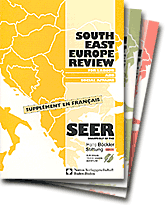Are trade unions effective accounting actors?
Are trade unions effective accounting actors?
Author(s): Romana CarejaSubject(s): Politics / Political Sciences
Published by: Nomos Verlag
Summary/Abstract: Eastern European trade unions are expected to take an active part in the transformation process. All the new EU members boast complex institutional frameworks which uphold such participation. Far from being an invention of politicians, union policy involvement has strong roots in the theory and practice of western (neo)corporatism and in democratic theory. And the transformation of socialist economies into market capitalist ones has given a new life to all these arguments. The starting point of this analysis is an idea put forward by Stark and Bruszt in their 1998 book Post-socialist Pathways. The authors claim that one of the conditions which lead to coherent policy-making is a dense accountability network through which governments are kept in check by organised societal interests such as trade unions. Moreover, these organisations not only keep the government accountable but also participate actively in the decision-making process. The authors entrust unions with great responsibility, but they do not define it clearly. To be fair, they do acknowledge that, between trade unions and government, a complex interaction takes place. They point to the ability of unions to elicit justifications or explanations from the government on a permanent basis as the sign of the existence of an accountability relationship between the two actors. But what exactly does this imply? It is the opinion of the author of this article that ‘continuity of relationship’ and ‘producing justifications’ rest on the fulfilment of several other conditions. The article proposes one such set of ‘enabling conditions’ and observes the extent to which they are fulfilled in selected eastern European cases. In so doing, the article attempts to answer the question whether trade unions are the accounting actors they are expected to be. The article builds on an analysis of union-government relations in Bulgaria, Czech Republic, Hungary, Poland, Romania and Slovak Republic between 1990 and 2004, using a combination of document analysis (reports and union documents) and a secondary analysis of specialised literature.
Journal: SEER - South-East Europe Review for Labour and Social Affairs
- Issue Year: 2007
- Issue No: 04
- Page Range: 83-106
- Page Count: 24
- Language: English

